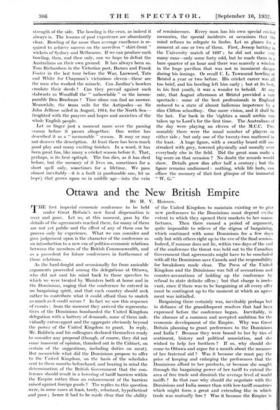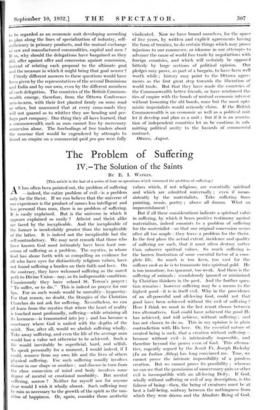Ottawa and the New British Empire
BY H. V. HODSON.
THE first imperial economic conference to be held . under Great Britain's new fiscal dispensation is over and gone. Let us, at this moment, pass by the details of the agreements reached there, for many of them are not yet public and the effect of any of them can be proven only by experience. What we can consider and give judgement upon is the character of the conference as an introduction to a new era of politico-economic relations between the members of the British Commonwealth, and as a precedent for future conferences in furtherance of those relations.
As the hard-fought and occasionally far from amicable arguments proceeded among the delegations at Ottawa, who did not cast his mind back to those speeches to which we were treated by Ministers both at home and in the Dominions, urging that the conference be entered in no bargaining spirit, and that each country should seek rather to contribute what it could afford than to snatch as much as it could secure ? In fact we saw this sequence of events : from the moment they arrived the representa- tives of the Dominions bombarded the United Kingdom delegation with a battery of demands, some of them indi- vidually extravagant and the aggregate obviously beyond the power of. the United Kingdom to grant. In reply, Mr. Baldwin and his colleagues declared themselves ready to consider any proposal (though, of course, they did not come innocent of opinion, thrashed out in the Cabinet, on certain of the suggestions, including duties on meat). But meanwhile what did the Dominions propose to offer to the United Kingdom; on the basis of the schedules sent to them months beforehand, and bearing in mind the determination of the British Government that the con- ference should result in a lowering of tariff barriers within the Empire rather than an enhancement of the barriers raised against foreign goods ? The replies to this question' were, in some cases at least, tardy, reluctant, hypothetical- ,and poor ; hence it had to be made clear that the ability. of the United Kingdom to maintain existing or to give new preferences to the Dominions must depend on the extent to which they opened their markets to her manu- factures. Then there ensued a period of argument, quite impossible to relieve of the stigma of bargaining, which continued with some Dominions for a few days only but with others right up to the eve of the final session. Indeed, if rumour does not lie, within two days of the end of the conference the threat was held out to the Canadian Government that agreements might have to be concluded with all the Dominions save Canada and the responsibility for breakdown made clear. The Press of the United Kingdom and the Doininions was full of accusations and counter-accusations of holding up the conference by refusal to state definite offers ; but that charge is irrele- vant, since if there was to be bargaining at all every offer must be contingent up to the moment at which an agree- ment was initialled.
Bargaining there certainly was, inevitably perhaps but in defiance of the grandiloquent resolves that had been expressed before the conference began. Inevitably, in the absence of a common and accepted ambition for the economic development of the Empire. Why was Great Britain planning to grant preferences to the Dominions and India ? Because they were bound to her by ties of sentiment, history and political association, and she wished to help her brothers ? If so, why should she come to Ottawa and argue for a month about the measure of her fraternal aid ? Was it because she must pay the price of keeping and enlarging the preferences that the Dominions afford to her products, or because she sought through the bargaining power of her tariff to extend the area of free trade and diminish the average level of world tariffs ? In that case' why should she negotiate with the Dominions and India sooner than with low-tariff countries which might form a great and extending bloc in which trade was mutually free ? Was it because the Empire is to be regarded as an economic unit developing according to plan along the lines of spedialization of industry, self- sufficiency in primary products, and the mutual exchange of raw and manufactured commodities, capital and men ? If so, why should the delegations have bargained as they did, offer against offer and concession against concession, instead of relating each proposal to the ultimate goal and the measure in which it might bring that goal nearer ? ; Utterly different answers to these questions would have been given by the representatives of the several Dominions and India and by our own, even by the different members of each delegation. The countries of the British Common- wealth emerge, therefore, from the Ottawa Conference arm-in-arm, with their feet planted firmly on some road or other, but unassured that at every cross-roads they will not quarrel as to whither they are heading and per- haps part company. One thing they all have learned, that a commonwealth such as ours cannot live by mercenary connexion alone. The forebodings of free traders about the rancour that would be engendered by attempts to found an empire on a commercial quid pro quo were fully vindieated. Now we have bound ourselves, for the space of five years, by written and explicit agreements having the form of treaties, to do certain things which may prove injurious to our commerce, or irksome in our attempts to advance the cause of world free trade by negotiations with foreign countries, and -Which will certainly be opposed bitterly by large sections of political opinion. Our pledges may prove, as part of a bargain, to have been well worth while ; history may point to the Ottawa agree- ments as the first great step towards the liberation of world trade. - But that they have made the countries Of the Commonwealth better friends, or have reinforced the ties of empire with the bonds of mutual economic interest without loosening the old bonds, none but the most opti- mistic imperialists would seriously claim. If the British Commonwealth is an economic as well as a political unit let it develop and plan as a unit ; but if it is an associa- tion of independent countries let us be' cautious in sub- mitting political amity to the hazards of commercial contract.
Ottawa, August.































 Previous page
Previous page